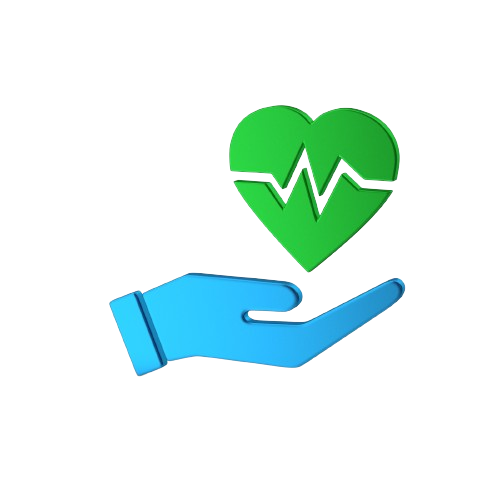
Heart
The heart is a small organ responsible for pumping blood throughout the body and is the core of your circulatory system. Electrical signals drive the four primary chambers of your heart. To maintain a heart-healthy lifestyle, it’s important to understand your risk factors, make healthy choices, and take steps to reduce the likelihood of developing heart disease. Preventive measures can significantly lower your risk.
Following a health check-up, your doctor may recommend routine diagnostic tests to identify any heart conditions.
Heart Health Checkup Package
HEART HEALTH CHECKUP
HS CRP
High-sensitivity C-reactive protein test detects inflammation, a significant contributor to heart disease, guiding preventive measures and treatment.
LIPID PROFILE
Evaluates cholesterol levels (HDL, LDL, and total cholesterol), With unbalanced cholesterol, you can develop fatty deposits in your blood vessels. Sometimes those deposits can break suddenly and form a clot that causes a heart attack or stroke.
ECG
Records the electrical activity of the heart to assess its rhythm and detect abnormalities such as arrhythmias, heart attacks, and heart muscle thickening (hypertrophy), aiding in early diagnosis and management of heart conditions.
PFT
A PFT or pulmonary function test, is a group of tests that measure how well your lungs work. A PFT can help a doctor to Diagnose lung disease, Monitor how well a lung disease is being treated, Guide treatment options, and Check how well your lungs respond to treatments.
499/-
COMPLETE BLOOD COUNT (CBC)
Essential for assessing overall health and detecting conditions like anemia or infection, which can impact heart function and circulation.
URINE R/M
Provides insights into kidney function and detects early signs of kidney disease, crucial as kidney health directly influences heart health.
FASTING BLOOD GLUCOSE (FBS)
Measures blood sugar levels after fasting to screen for diabetes, a major risk factor for heart disease when poorly controlled.
PMBS
Post-meal blood sugar test to monitor how well the body manages glucose after eating, vital for preventing diabetes-related heart complications.
HBA1C
Shows average blood sugar levels over several months, aiding in long-term diabetes management to prevent heart disease and vascular damage.
LIPID PROFILE COMPLETE
Evaluates cholesterol levels (HDL, LDL, and total cholesterol), With unbalanced cholesterol, you can develop fatty deposits in your blood vessels. Sometimes those deposits can break suddenly and form a clot that causes a heart attack or stroke.
LIPOPROTEIN A
Specifically measures a type of cholesterol linked to higher cardiovascular risk, aiding in personalized heart disease prevention strategies.
APOLIPOPROTEIN A1
Assesses levels of a protein associated with HDL cholesterol, providing additional insights into heart disease risk beyond standard lipid tests.
APOLIPOPROTEIN B
Measures a protein linked to LDL cholesterol metabolism, helping to refine cardiovascular risk assessment and guide treatment decisions.
HS CRP
High-sensitivity C-reactive protein test detects inflammation, a significant contributor to heart disease, guiding preventive measures and treatment.
SGPT
Liver enzyme test that, when elevated, may indicate liver damage or disease that can impact heart health and overall well-being.
SGOT
Another liver enzyme test that, when abnormal, can suggest liver dysfunction affecting heart health and overall metabolic balance.
TSH
Evaluates thyroid function, crucial as thyroid disorders can contribute to heart problems such as arrhythmias and elevated cholesterol levels.
VITAMIN B12
Measures vitamin B12 levels important for nerve function and blood cell production, indirectly supporting heart health through overall metabolic balance.
VITAMIN D3
Assesses vitamin D levels, crucial for bone health and potentially influencing heart disease risk through its role in inflammation and blood pressure regulation.
HOMOCYSTEINE
Measures a compound linked to higher heart disease risk, helping in early detection and prevention strategies through dietary and lifestyle interventions.
2999/-
COMPLETE BLOOD COUNT (CBC)
Essential for assessing overall health and detecting conditions like anemia or infection, which can impact heart function and circulation.
URINE R/M
Provides insights into kidney function and detects early signs of kidney disease, crucial as kidney health directly influences heart health.
FASTING BLOOD GLUCOSE (FBS)
Measures blood sugar levels after fasting to screen for diabetes, a major risk factor for heart disease when poorly controlled.
PMBS
Post-meal blood sugar test to monitor how well the body manages glucose after eating, vital for preventing diabetes-related heart complications.
HBA1C
Shows average blood sugar levels over several months, aiding in long-term diabetes management to prevent heart disease and vascular damage.
LIPID PROFILE COMPLETE
Evaluates cholesterol levels (HDL, LDL, and total cholesterol), With unbalanced cholesterol, you can develop fatty deposits in your blood vessels. Sometimes those deposits can break suddenly and form a clot that causes a heart attack or stroke.
LIPOPROTEIN A
Specifically measures a type of cholesterol linked to higher cardiovascular risk, aiding in personalized heart disease prevention strategies.
APOLIPOPROTEIN A1
Assesses levels of a protein associated with HDL cholesterol, providing additional insights into heart disease risk beyond standard lipid tests.
APOLIPOPROTEIN B
Measures a protein linked to LDL cholesterol metabolism, helping to refine cardiovascular risk assessment and guide treatment decisions.
HS CRP
High-sensitivity C-reactive protein test detects inflammation, a significant contributor to heart disease, guiding preventive measures and treatment.
SGPT
Liver enzyme test that, when elevated, may indicate liver damage or disease that can impact heart health and overall well-being.
SGOT
Another liver enzyme test that, when abnormal, can suggest liver dysfunction affecting heart health and overall metabolic balance.
TSH
Evaluates thyroid function, crucial as thyroid disorders can contribute to heart problems such as arrhythmias and elevated cholesterol levels.
VITAMIN B12
Measures vitamin B12 levels important for nerve function and blood cell production, indirectly supporting heart health through overall metabolic balance.
VITAMIN D3
Assesses vitamin D levels, crucial for bone health and potentially influencing heart disease risk through its role in inflammation and blood pressure regulation.
HOMOCYSTEINE
Measures a compound linked to higher heart disease risk, helping in early detection and prevention strategies through dietary and lifestyle interventions.
ECG,2D ECHO
ECG: Records the electrical activity of the heart to assess its rhythm and detect abnormalities such as arrhythmias, heart attacks, and heart muscle thickening (hypertrophy), aiding in early diagnosis and management of heart conditions.
2DECHO: Uses sound waves to create detailed images of the heart’s structure and function, essential for diagnosing heart conditions such as valve disorders, heart failure, and congenital abnormalities.
TMT
Evaluates heart function under stress (exercise), detecting abnormalities in heart rate, blood pressure, and ECG patterns that may not be evident at rest, crucial for assessing cardiovascular fitness and risk.
X-RAY CHEST PA VIEW
Provides a snapshot of the heart, lungs, and surrounding structures, helping to detect conditions like heart enlargement, fluid buildup (pulmonary edema), and lung abnormalities that impact heart function.
5999/-
Simple Steps to Complete Your Health Checkup
Booking Made Easy
Book through our website or call 91148-91148.
Guidance
Health Advisors and medical advisors provide guidance on the testing process.
Sample Collection
Free sample collection at home or office (when available) by our skilled team, or visit NADL Healthcare.
Processing & Verify
Rest assured, your temperature-controlled sample will be safely processed.
Report and Support
Get your report quickly via WhatsApp or pick it up from NADL Healthcare.
Contact NADL Healthcare
At NADL Healthcare, we are dedicated to your heart health. Book your Heart Health Checkup Package today and take the first step towards a healthier heart. Our state-of-the-art facilities and expert team ensure accurate results and personalized care. Contact us now to schedule your appointment or learn more about our heart health checkup services in Indore.
Our Address
Navjeevan Tower, 8/2, Near Saket Square, Old Palasia, Indore, Madhya Pradesh 452001
Our Phone
Our Email
info@nadlhealthcare.com
support@nadlhealthcare.com
Contact Us
- Navjeevan Tower, 8/2, Near Saket Square, Old Palasia, Indore, Madhya Pradesh 452001
- 9114891148
- info@nadlhealthcare.com


